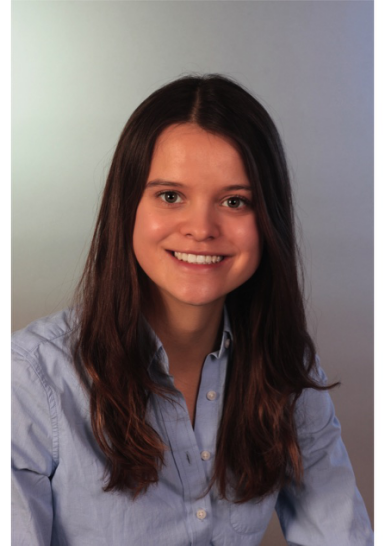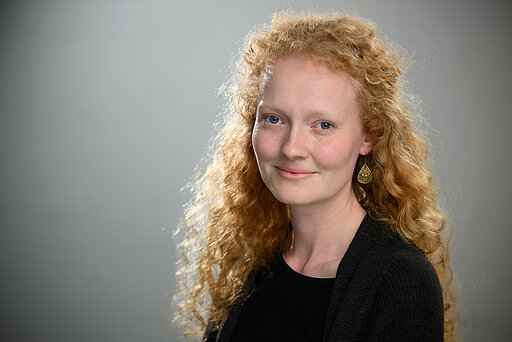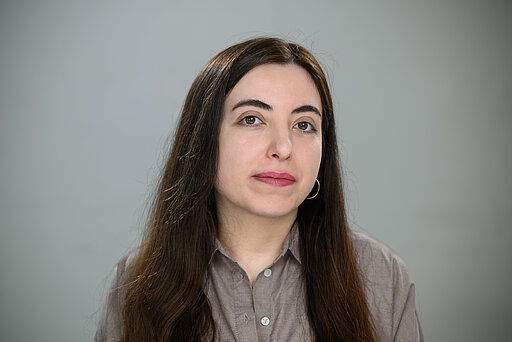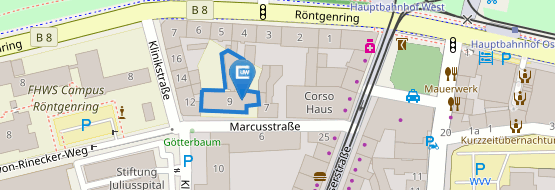Associated PhD Students
If you recently started your PhD at the University of Würzburg and your research is concerned with the neurobiology of approach and avoidance, you can join the RTG 2660 as associated PhD student.
Interested? Please get in touch!
Anika Busch
Margarete-Höppel-Platz 1
97080 Würzburg
Anika Busch is a PhD student in the Developmental Psychiatry Lab of Prof. Dr. med Lorenz Deserno and an associated member of the RTG2660.
Her primary research focus is on understanding the cognitive processes underlying behaviour, both behaviourally and neurally, in typically developing children and adolescents, as well as in those with ADHD. Specifically, she investigates cognitive aspects such as waiting impulsivity, social approach and avoidance, and examines clinical data to assess changes in patients before and after stimulant medication treatment.
In addition to her PhD research, Anika is pursuing clinical training to become a psychotherapist.
Outside of her academic and clinical work, she enjoys various sports, particularly horse riding, and has a passion for good food.

Fiona Dewender
University Hospital Würzburg
Josef-Schneider-Str. 11
97080 Würzburg
Deutschland
Fiona Dewender is a doctoral researcher (Head: Prof. Dr. med. Claudia Sommer) and joins the RTG2660 as an associated PhD student.

Paula Engelke
Research Group: Cognitive Control in the Context of Stress and Health
Department of Psychology
University of Würzburg
Marcusstr. 9-11
97070 Würzburg
Germany
Paula Engelke is a doctoral researcher in the research group ‘Cognitive Control in the Context of Stress and Health’ (Head: Prof. Dr. Andre Pittig) and joins the RTG2660 as an associated PhD student. Her research focuses on extinction learning, avoidance and its generalization in humans, using laboratory fear conditioning paradigms. Outside of research, she enjoys literature, food, and of course coffee.

Klara Gregorova
Margarete-Höppel-Platz 1
Klara Gregorova is a PhD researcher in the research group "Learning and Motivation in Developmental Psychopathology and Psychotherapy" (Head: Prof. Dr. Andrea Reiter).
She joins the RTG2660 as an associated PhD student and plans to research interactions of mood, self-esteem and reward learning.
Klara studied psychology at the University of Frankfurt, where she worked on computational models of visual word recognition.
Outside of research, she enjoys playing piano, reading, and hiking.

Chantal Hampf
Department of Psychiatry, Psychotherapy and Psychosomatic Medicine
Margarete-Höppel-Platz 1
97080 Würzburg
Germany
Chantal Hampf is a doctoral researcher in the Functional Genomics group and joins the RTG2660 as an associated PhD student.
In her PhD project, she focuses on molecular aspects of the underlying causes and treatments of affective disorders (anxiety disorders, depression).
Therefore she aims to replicate several risk genes for anxiety disorders from genome-wide association studies in own samples.
This samples should also be functionally characterized, using different psychometric questionnaires, mRNA expression profiles, imaging data and psychological behavioral tests in cooperation with different research groups.
Prior to her PhD, she studied pharmacy at the University of Frankfurt and received her approbation as pharmacist.

Eleni Kakavela
University Hospital Würzburg
Josef-Schneider-Str. 11
97080 Würzburg
Deutschland
Eleni Kakavela is a medical doctor and a clinical researcher at the University Hospital of Würzburg, in the department of Neurology.
She joins the RTG2660 as a doctoral researcher in the „VirtualNoPain“ Project (Head: Prof. Dr. med. Sommer).
The research focuses on the combination of virtual reality and neurofeedback-training in the chronic pain treatment.
Beyond research, she enjoys debating, foreign language learning and visiting her country of origin, Greece.

Ulkar Huseynzade
Röntgenring 10
97070 Würzburg
Germany
Ulkar Huseynzade is a PhD Researcher in Prof. Eder’s lab. She joins the RTG2660 as an associated Doctoral Researcher.
She is interested in the mechanisms of approach-avoidance behavior with providing a useful testbed. She is also curious about finding out how threat-related avoidance can be minimized by approach incentives and how the different individual traits affect this process.

Salomea Löffl
University Hospital Würzburg
Josef-Schneider-Str. 11
97080 Würzburg
Deutschland
Salomea Löffl is a doctoral researcher (Head: Prof. Dr. med. Claudia Sommer) and joins the RTG2660 as an associated PhD student.

Jana Ludwig
University of Würzburg
Marcusstraße 9
97070 Würzburg
Germany
Jana Ludwig is a doctoral researcher in Prof. Garvert’s and Dr. Wessel’s labs and is joining the RTG2660 as an associated student. She is planning to study the neurocognitive mechanisms underlying decision-making, both in people with and without Parkinson’s disease, using behavioral experiments, computational modeling, and neurostimulation.
Jana has studied psychology at the universities of Düsseldorf and Münster and has worked on a coordinate-based neuroimaging meta-analysis for her master’s thesis. Outside of research, she enjoys exploring new places, reading, hiking, and doing sports (with ultimate frisbee being her most recent discovery, and a pretty challenging one, too).

Jessica Reinhart
Margarete-Höppel-Platz 1
97080 Würzburg
Jessica Reinhart is a PhD researcher in the research group "Learning and Motivation in Developmental Psychopathology and Psychotherapy" (Head: Prof. Dr. Andrea Reiter) and joins the RTG2660 as an associated PhD student.
Her research project is a follow-up study of the SFB/TRR 58 “Fear, Anxiety and Anxiety Disorders” project Z02 “Dynamics of fear generalization processes and their predictive value for the development of anxiety-related psychopathologies in adolescents and adults: the role of age, life events, coping strategies and (epi-)genetic factors”.
Prior to her PhD, she studied psychology at the University of Würzburg.
Outside of research, Jessica works as a clinical psychologist and enjoys hiking, playing tennis, and cooking.

Zora Schickardt
Department of Psychiatry, Psychotherapy and Psychosomatic Medicine
University Hospital Würzburg
Margarete-Höppel-Platz 1
97080 Würzburg
Germany
Zora Schickardt is a doctoral researcher in the Cell Culture and Biomarkers Research Group at the Center of Mental Health and joins the RTG2660 as an associated PhD student. In her PhD project, she investigates mitochondrial function in cell models of PARK2 copy number variant carriers with adult Attention deficit/hyperactivity disorder (ADHD). In a previous study, the evaluation of the cellular phenotype of human dermal fibroblast and dopaminergic neurons derived from human induced pluripotent stem cells revealed impaired energy metabolism and hints for mitochondrial dysfunction in ADHD/PARK2 CNVs carriers compared to wildtype controls. Based on this, she will conduct further analyses of mitochondrial alterations in ADHD-related cell types such as cortical neurons and blood-brain barrier endothelia to validate mitochondrial dysfunction as a potential target for novel therapies and to investigate a possible role of BBB dysfunction in ADHD. Besides her research, she enjoys being in nature and relaxing on the banks of the Main.

Ecem Tavacıoğlu
Department of Psychology
University of Würzburg
Marcusstr. 9-11
97070 Würzburg
Ebru Ecem Tavacıoğlu is a PhD researcher in Prof. Gamer’s lab and joins the RTG2660 as an associated PhD student. She plans to investigate the characteristics and neural regulation of defensive states in humans by using MRI.
Prior to her PhD studies, Ecem obtained a Bachelor's degree in Psychology at Istanbul Sehir University and a Master's degree in Neuro-Cognitive Psychology at Ludwig-Maximilians-Universität München. She worked on several projects including visual perception and attention, body representation, and semantic language processing by using different neuroimaging techniques in different labs.
Apart from research life, she is very interested in gastronomy, ceramic art, yoga and mindfulness.

Janna Teigeler
Department of Psychology
University of Würzburg
Marcusstr. 9-11
97070 Würzburg
Janna Teigeler is a PhD researcher in Prof. Gamer’s lab. She joins the RTG2660 as an associated PhD student and plans to research approach and avoidance conflicts, especially in Social Anxiety Disorder.
Prior to her PhD, she studied psychology at the University of Würzburg, where she discovered her interest in neuroscientific research.
Outside of research, she enjoys cooking, baking sourdough bread and loves to go hiking.

Yuheng Shi
Department of Psychology
University of Würzburg
Marcusstr. 9-11
97070 Würzburg
Raum: 204
Yuheng Shi is a Phd researcher in Prof. Garvert’s lab and joins the RTG2660 as an associated PhD student. She plans to study the fundamental cognitive process - generalization in a context-dependent manner - with computational modeling and functional magnetic resonance imaging.
Prior to her PhD studies, Yuheng obtained her undergraduate degree in Economics at the University of Hong Kong and a Master degree in Cognitive Neuroscience at Donders Institute. Outside of her research, she enjoys reading and playing the violin.
Fabio Felisati
University clinic
Versbacher Str. 5
97078 Würzburg
Fabio Felisati is a Phd student in the lab of Prof. Tovote. Before moving to Würzburg he studied Biology and Neurobiology, researching how the motor cortex is affected by a dopamine depletion in a mouse model of Parkison’s disease.
During his free time he loves playing basketball as well as watch sports, listening to music and collecting vinyls.
Dominic Fess
Marcusstraße 9

Zhuolin Zhao
University Hospital Würzburg
Josef-Schneider-Str. 11
Zhuolin Zhao is a PhD researcher in Prof. Sommer's group. She investigates changes in response to preventive treatment in migraine trigger avoidance and CGRP blood levels.

Seyedehmona Hashemianahmadi
University Hospital Würzburg
Josef-Schneider-Str. 11
Mona Hashemian is a PhD researcher at the University Hospital Würzburg, working under the supervision of Prof. Claudia Sommer. Her research focuses on the mechanisms of chemotherapy-induced peripheral neuropathy and pain resolution, with a particular interest in neuroimmune interactions, sensory neuron plasticity, and the role of neuropeptides such as CGRP in modulating pain hypersensitivity. Using behavioral, molecular, and histological approaches in rodent models, she aim to better understand how peripheral and central pathways contribute to the onset and resolution of neuropathic pain. In addition, she will contribute to studies on CGRP-mediated pain mechanisms in humans, supporting the team in conducting CGRP ELISA analyses and C-fiber recordings to explore neuroimmune and sensory processes involved in pain modulation.



